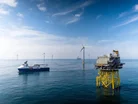Why has a Court Overturned North Sea Oil Field Approvals?

The Court of Session in Edinburgh has ruled that the UK Government's consent for two major oil and gas fields in the North Sea—Jackdaw and Rosebank—was unlawfully granted.
The landmark decision, made on 30 January, mean project owners Shell, Equinor and Ithaca must seek new approval from the government before commencing drilling operations.
Legal challenges and environmental concerns
Environmental groups, including Greenpeace and Uplift, had challenged the legitimacy of the government's approval process, driving the legal battle over these developments.
- Insufficient environmental impact assessment: Critics argued that the government failed to properly assess the full scope of emissions, particularly Scope 3 emissions from burning the extracted oil and gas.
- Unlawful approval process: The UK government acknowledged that the prior Secretary of State's decisions to approve the projects were legally flawed.
- Potential environmental damage: Campaigners warned that these projects could negatively impact marine protected areas in the North Sea.
- Lack of transparency: Environmental groups claimed inadequate transparency in the decision-making process.
- Climate concerns: Activists contended that these projects contradict the UK's climate commitments and contribute to global environmental challenges.
Greenpeace, a key player in the legal challenge, stated: "Jackdaw and Rosebank were both approved under the false claim that they are compatible with the UK's legally binding climate commitments."
Shell's Jackdaw Project
The Jackdaw gas field, situated 250 km east of Aberdeen, is expected to generate enough fuel to heat 1.4 million UK homes—approximately 6% of the UK's projected North Sea gas production.
Key developments in the recent timeline include:
- January 2020: Shell submitted an Environmental Statement to the Department for Business, Energy & Industrial Strategy (BEIS).
- June 2022: Following an environmental impact assessment, the North Sea Transition Authority (NSTA) granted development consent.
- January 2025: The court ruled that while work can proceed, drilling cannot commence until new consent is obtained.
Shell has defended the necessity of its investment, stating that, without domestic oil and gas infrastructure, the UK will have to import 80% of its gas by 2030.
Equinor's Rosebank Project
Equinor, which owns 80% of the Rosebank site, remains committed to the project, arguing that it is crucial for energy security and job creation.
Rosebank is estimated to hold around 300 million barrels of oil, most of which is expected to be exported.
"Oil and gas will be needed to power the global economy for many years to come. This project is part of our contribution to energy security and creating jobs for Britain."
The project anticipates creating 2,000 jobs and contributing 7% of the UK's oil production between its first oil extraction and 2030. Equinor plans to implement electrification measures to reduce CO₂ emissions from production.
Implications of the court ruling
Judge Lord Ericht's ruling allows preparatory work on both sites to continue while a more comprehensive environmental assessment is conducted. However, the companies cannot extract any oil or gas can be extracted until the granting of new government approval.
Greenpeace UK's Philip Evans described the ruling as a "historic win", highlighting that the era of governments approving drilling projects without full climate impact assessments is over.
Shell highlighted the urgency of government action: "Swift action is needed from the government so that we and other North Sea operators can make decisions about vital UK energy infrastructure."
Equinor echoed this sentiment, highlighting the economic benefits: "Rosebank is critical for the UK's economic growth, with an estimated 77% or US$8.2bn of total direct investment benefiting UK businesses."
What next?
While the ruling does not permanently halt these projects, it forces the government to conduct a more rigorous review process.
The outcome will set a precedent for future North Sea oil and gas developments, balancing economic interests with climate commitments.
The coming months will determine whether Jackdaw and Rosebank will proceed under stricter environmental scrutiny.
Make sure you check out the latest industry news and insights at Scope 3 Magazine and be part of the conversation at our global conference series, Sustainability LIVE and Procurement & Supply Chain LIVE.
Discover all our upcoming events and secure your tickets today. Subscribe to the Scope 3 Magazine newsletter.
Scope 3 Magazine is a BizClik brand.
- Maersk Sustainability Reporting: Navigating Scope 3Transportation & Logistics
- SHEIN’s Scope 3 Emissions: Fast Fashion’s Carbon BurdenCircular Economy
- Tackling Super Bowl LIX's Scope 3 Emissions ChallengeScope 1 2 and 3
- NetApp’s SBTi Validation Marks Sustainability MilestoneScope 1 2 and 3

